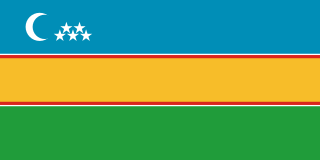
The State Anthem of the Union of Soviet Socialist Republics was the national anthem of the Soviet Union and the regional anthem of the Russian Soviet Federative Socialist Republic from 1944 to 1991, replacing "The Internationale". Its original lyrics were written by Sergey Mikhalkov (1913–2009) in collaboration with El-Registan (1899–1945), and its music was composed by Alexander Alexandrov (1883–1946). For a two-decade interval following de-Stalinization, the anthem was performed without lyrics. The second set of lyrics, also written by Mikhalkov and in which Stalin's name was omitted, was adopted in 1977.

Karakalpakstan, officially the Republic of Karakalpakstan, is an autonomous republic of Uzbekistan. It spans the northwestern portion of Uzbekistan. Its capital is Nukus. Karakalpakstan has an area of 166,590 km2 (64,320 sq mi), and has a population of about 2 million people. Its territory covers the classical land of Khwarazm, which in classical Persian literature was known as Kāt (کات).

Karakalpak is a Turkic language spoken by Karakalpaks in Karakalpakstan. It is divided into two dialects, Northeastern Karakalpak and Southwestern Karakalpak. It developed alongside Nogai and neighbouring Kazakh languages, being markedly influenced by both. Typologically, Karakalpak belongs to the Kipchak branch of the Turkic languages, thus being closely related to and highly mutually intelligible with Kazakh and Nogai.

The State Anthem of the Kirghiz SSR was the national anthem of the Kirghiz Soviet Socialist Republic. The music was composed by Vladimir Vlasov, Abdylas Maldybaev and Vladimir Fere, and the lyrics were written by Kubanychbek Malikov, Tulgebai Sydykbekov, Mukanbet Toktobaev, and Aaly Tokombaev.

The National Anthem of the Kyrgyz Republic was adopted on 18 December 1992 by a resolution of the Supreme Council of Kyrgyzstan. The music was composed by Nasyr Davlesov and Kalyi Moldobasanov, and the words were written by Jalil Sadykov and Shabdanbek Kuluyev.

Nukus is the sixth-largest city in Uzbekistan and the capital of the autonomous Republic of Karakalpakstan. The population of Nukus as of 1 January 2022 was 329,100. The Amu Darya river passes west of the city. Administratively, Nukus is a district-level city, that includes the urban-type settlement Karatau.

The Karakalpak Autonomous Soviet Socialist Republic, also known as Soviet Karakalpakstan or simply Karakalpakstan, was an autonomous republic within the Soviet Union. Until 20 July 1932, it was called the Karakalpak Autonomous Oblast. On 5 December 1936, it was moved from the Russian SFSR to the Uzbek SSR. It was the only ASSR in Soviet Central Asia.
The Nukus Museum of Art, or more properly the State Museum of Arts of the Republic of Karakalpakstan named after I.V. Savitsky, is located in Nukus, Karakalpakstan. It possesses the world's second largest collection of Russian avant-garde artworks, as well as galleries of antiquities and Karakalpak folk art. In total, there are more than 82,000 items in the museum's collection. The museum was described by The Guardian as the Louvre of Uzbekistan.

The national symbols of Kyrgyzstan are defined by Article 6 of the Constitution of Kyrgyzstan. They consist of the National Flag, the National Emblem, and the National Anthem.

Kegeyli district is a district of Karakalpakstan in Uzbekistan. The capital lies at the town Kegeyli. Its area is 920 km2 (360 sq mi) and it had 73,600 inhabitants in 2022.

Qońirat district is a district of the Republic of Karakalpakstan, with Qońirat as its seat. Its area is 76,000 km2 (29,000 sq mi) and it had 132,800 people in 2022.

The State Anthem of the Azerbaijan Soviet Socialist Republic was the anthem of Azerbaijan when it was a part of the former Soviet Union. It was created in 1944 and was used from 1945 to 1992 upon the nation's independence.
Erkin Qaraqalpaqstan is the main Karakalpak language newspaper, published in Uzbekistan. As of 2007, it printed 2700 copies three times a week, down from 66,000 five times a week in 1975.
Bozataw, formerly Qazanketken is an urban-type settlement in Karakalpakstan in Uzbekistan. It is the seat of Bozataw district.

The Emblem of Karakalpakstan is one of the official symbols of Karakalpakstan, an autonomous republic within Uzbekistan. It was approved on April 9, 1993. The coat of arms was developed from a sketch by Karakalpak artist Jollybai Izentaev based on the emblem of Uzbekistan.
Marinika Babanazarova is an Uzbekistani museologist and curator, mostly known for being a director of Nukus Museum of Art for thirty years after death of its founder Igor Savitsky.

The state flag of Karakalpakstan is one of the official symbols of Karakalpakstan, an autonomous republic within Uzbekistan. It was designed from a sketch by Karakalpak artist Zhollybai Izentaev. The flag is based on the flag of Uzbekistan.
Qaraqalpaqstan, officially Qaraqalpaqstan tеlеvideniesi is an Uzbek television channel owned by the National Television and Radio Company of Uzbekistan, broadcasting to the autonomous republic of Karakalpakstan. The channel broadcasts 18 hours a day and airs programming in four languages, Karakalpak, Uzbek, Kazakh and Russian.

The Berdakh's Karakalpak State University is a public university in Nukus, capital of autonomous Republic of Karakalpakstan in north-western Uzbekistan. The university is flagship institution of higher education of Karakalpakstan and its biggest academic and research centre.

The Constitution of Karakalpakstan is the fundamental legal document that governs the Republic of Karakalpakstan, an autonomous republic within Uzbekistan. It operates within the framework of Constitution of Uzbekistan and national laws, ensuring the region's self-governance while maintaining alignment with the central government.













